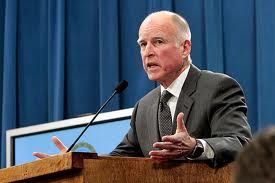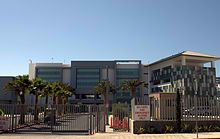Jerry Brown twists out ‘pretzel palace’ budget
May 14, 2012
By Katy Grimes
SACRAMENTO–Setting the stage for the Legislature to pass another phony majority vote budget, Democratic Gov. Jerry Brown presented a bleak picture of the state’s finances today during his May Budget Revision conference, and then challenged the press to come up with a better plan.
Despite his repeated claims that he was increasing austerity by calling for higher taxes, cuts to health and welfare programs, as well as a 5 percent furlough cut to state employees, Brown’s budget cuts will still not spare taxpayers.
The governor reported that California’s budget deficit has grown to nearly $16 billion, shockingly higher than the apparent guesstimates of $9 billion in January.
“The May Revision is based on the assumed passage of the Governor’s tax initiative,” the plan from the Department of Finance said. “The Governor’s proposal “temporarily increases tax rates on the highest income Californians, and temporarily increases the Sales and Use Tax rate by 0.25 percent,” resulting in the anticipated $8.5 billion in additional tax revenue to the state coffers.
And if you believe that the taxes are temporary, I’ve got a bridge to sell you.
Tax the millionaires… I mean the ‘affluent’
“Please increase taxes on the most affluent,” Brown asked. “It’s reasonable and fair.”
What is not fair or even reasonable is that the voters have not been participants to the historic spending by the state. The increased spending and budget deficits, according to Brown, has gone on since Earl Warren was governor (1943-1953). The deficit spending is largely spent on welfare programs, including education welfare give-aways, and on growing state employee pensions.
The revised budget includes a $91.4 billion general fund spending plan, a one-time infusion of funds from the multi-state mortgage abuse settlement with large banks, Brown’s November tax initiative and more cuts.
Total spending in the state budget is $4.6 billion more than Brown’s January budget proposal, leaving many to ask if Brown’s call for more taxes is just to be able to continue increasing state spending.
“The budget is a pretzel palace of complexity.” Brown said.
Brown posted a youtube video over the weekend and said that the budget he signed last year was an improvement in ending budget deficits. But it still was dramatically unbalanced by $4.6 billion. “By the time I leave here, California’s budget will be balanced and the state will be back on road to prosperity,” Brown insisted. “I am a buoyant optimist.”
The tail is wagging the dog
Last week, the Sacramento Bee reported that SEIU Local 1000 President Yvonne Walker said she had been in talks with Brown about the revised budget, and refused to agree to state worker furloughs.
Walker published a memo about the upcoming budget revise, as well as her demands for state workers. “Under the previous governor, our input was not sought, in fact, it was dismissed. Under Gov. Brown, we have a seat at the table,” Walker’s memo stated. “We have offered our own proposals to deal with this crisis.”
Walker specifically recommended cutting private vendor contracts, eliminating the use of retired annuitants and, only if necessary, implementing a four-day, 40-hour work week.
Walker’s recommendations are coincidentally what Brown proposed in his May Revise budget.
However, Brown said he will ask state employees to work four days a week, 9.5-hour shifts for a weekly total of 38 hours. This recommendation will undoubtedly be challenged by the state’s labor unions.
The dog is wagging the tail
The governor said that, if his tax initiative is not approved in November, K-12 schools and community colleges would be cut by $5.5 billion.
“Schools will suffer,” said Brown.
The University of California and California State University systems would split another $500 million cut–$50 million less than Brown proposed in his January budget.
The one positive cut in Brown’s revised budget is the proposed cuts to Cal Grants, which would result in the imposition of tighter high school graduation requirements and more stringent proof of family income.
Cuts to the Courts
California courts are already burdened with a crumbling infrastructure. Brown’s revised budget will make this worse. He proposed cutting $544 million from the state’s trial courts, $300 million from their reserves and $240 million by further delaying court construction.
This is bad news for the overburdened court system, which has already delayed the construction of several much-needed courthouses, as well as decades of deferred maintenance.
Brown also proposed increasing court employee retirement contributions from 5 percent to 8 percent.
And Brown is asking for another cut to In-Home Supportive Services, and further cuts to Medi-Cal hospitals and nursing homes.
Responses to the May Budget Revision
“Tax revenue is up two years in a row, but not enough to satisfy the spending demands of Sacramento Democrats,” retorted Assembly Republicans. “It will be interesting to see if the liberal majority in the Legislature accept the Governor’s cuts, or reject them as they did earlier this year when they blocked the Governor’s health and welfare reforms and grew spending by $1 billion,” wrote Assembly Minority leader Connie Conway, R-Visalia, and Assemblyman Jim Nielsen, R-Biggs.
However, there was no acknowledgment by the governor of the steady exodus from California over the last 20 years, resulting in the substantial loss of tax revenues. Four million taxpaying residents have left the state in search of less government intrusion, fewer regulations and lower taxes.
“Our government is not structured to quickly and effectively respond to an economic crisis of this magnitude,” said Sen. Pres. Pro Tem Darrell Steinberg, D-Sacramento. ”We are so balkanized that the people don’t know who collects the taxes and who provides the services.”
Steinberg also admitted that “the share of corporate income tax paid in California has fallen by nearly half since 1981. Personal consumption in California has fallen by the largest percentage since 1980,” Steinberg said.
“Amazingly, a year and a half into Brown’s governorship and we still hear nothing of the unemployed,” said California Republican Party Chairman Tom Del Beccaro. “California will continue to face chronic budget deficits because so many people remain out of work; the conversation about revenues should always begin with how to restore jobs. So many people are wondering when Brown will offer plans to make California competitive, so that business will return to this state and bring jobs with them.”
Before the ink was even dry on the Governor’s speech, California Labor Federation leader Art Pulaski called for a review of corporate tax breaks. Calling for voters to approve Gov. Brown’s tax initiative in November, Pulaski said, “The state has to eliminate the maze of loopholes, carve-outs and tax-dodges that corporate lobbyists have written into law over the years…”
“It’s high time that our system reflects the interests of middle-class Californians, not the special interests of corporate CEOs and their lobbyists,” Pulaski said. But he said nothing about the special interests of union lobbyists, union attorneys and union politicians.
It is hard not to ask if Brown’s tax increases will force more to exit the state and further deplete California of tax revenues, especially whe California tax increases take hold, and federal tax cuts expire.
One Twitter follower asked, “Is this the perfect storm for financial ruin?”
The elephant in the room looms large: Is California hoping for a bailout? Are we too big to fail? Some say that $5 trillion in new debt under Brown’s turn as governor makes a bailout impossible, leaving only tax and fee increases.
The exodus of 4 million California residents in the last 20 years will continue to rise commensurately with higher taxes, until only state workers and welfare recipients are left.
Brown said the state and the nation has been living beyond its means. “There has to be a balance and a day of reckoning,” Brown said. “This is the day of reckoning…We have to take our medicine.”
“What government does is good,” Brown said. “I did my best.”
Related Articles
Will State Pay For Special Elections?
JAN 14, 2011 By ANTHONY PIGNATARO The best current estimated cost for Governor Jerry Brown’s proposed special election on whether
Budget dominates new session
By JOHN SEILER What a difference three years makes. In January 2007, Gov. Arnold Schwarzenegger was fresh off his resounding
CalPERS seeks to be new California ‘Octopus’
Dec. 17, 2012 By Wayne Lusvardi In 1901, Frank Norris wrote a novel, “The Octopus: A Story of California.” The book




